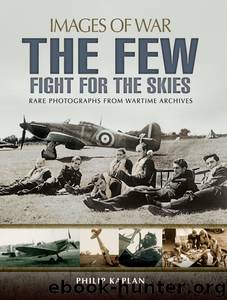The Few by Philip Kaplan

Author:Philip Kaplan
Language: eng
Format: epub
Tags: HISTORY / Military / World War II
ISBN: 9781473854437
Publisher: Pen and Sword
Published: 2015-02-26T16:00:00+00:00
Flight Lieutenant J. A. Kent of Nos. 303 and 92 Squadrons in the Battle.
At Duxford airfield, Cambridgeshire, forty miles north of London, Squadron Leader Douglas Blackwood had faced identical problems to Kellett’s. As commander of No. 310 (Czech) Squadron, Blackwood, in peacetime an Edinburgh publisher, had charge of thirty-six Czech pilots who had travelled a similar rough road, via the Balkans and France, to that of the Poles. Save for their interpreter Flying Officer Cesek, no man among them was versed in either English or French. Yet from 18 June onwards, when the first contingent of Czechs emerged from a heavy bomber in southern England, they took infinite pains to demonstrate their willingness. When the contractor assembling their hutted camp at Duxford bemoaned the shortage of hands, 310, under Squadron Leader Sasha Hess, weighed in as builder’s labourers—donating the ten pounds in wages to the Czechoslovak Red Cross in London.
Whatever they lacked, it was not belly-fire. On 26 August, their first operational flight, 310 dispensed with the vexatious business of taxiing round the airfield and took off riskily downwind—a manoeuvre that won them an extra two minutes of precious combat time. Returning to base with all their ammunition spent, they had already accounted for two Dornier 215s and one Messerschmitt 110 twin-engined fighter.
As determined as the Poles never to lose face before their RAF hosts, the Czechs had a summary way with any who let down the side. On one occasion, a Czech non-com, in an abortive take-off, tipped a Hurricane clumsily on its nose. Immediately Squadron Leader Hess led the man summarily behind a hangar, prompting Blackwood to intervene. Fisticuffs between officers and men, he stressed, was strictly forbidden in the RAF. “Fists?,” echoed Hess, appalled by such a plebeian suggestion, “I shoot him!”
By chance, the Battle’s top-scoring Czech pilot served not with 310 but as a lone wolf among the Poles of 303: Sergeant Josef Frantisek, a stocky impressive youngster with beetling eyebrows, who had nurtured a deadly hatred for the Germans for almost two years. A regular in the Czech Air Force, Frantisek’s last act above his native soil was to strafe the German troops annexing the Republic in 1939 before flying on to Poland. Phlegmatically accepting a drop in rank from Lieutenant to Corporal, Frantisek was to serve as an air observer with the Poles until September, 1939. In that three-week war, airborne in an ancient PZL fighter, he shot down three German aircraft before escaping through Rumania and Syria to France.
Few other Allied pilots—whether New Zealanders, Irishmen, Canadians, Australians or South Africans—knew any such corroding emotions. The one factor that most had in common was a burning ambition, often nourished since their teens, to fly and keep on flying. A case in point was the New Zealander Colin Flakland Gray, born in Papanui, Christchurch, in 1914, whose whole life was changed, while still at school, by an RAF recruiting talk. Told to report for a medical examination in Wellington while still groggy with flu, Gray
Download
This site does not store any files on its server. We only index and link to content provided by other sites. Please contact the content providers to delete copyright contents if any and email us, we'll remove relevant links or contents immediately.
| Africa | Americas |
| Arctic & Antarctica | Asia |
| Australia & Oceania | Europe |
| Middle East | Russia |
| United States | World |
| Ancient Civilizations | Military |
| Historical Study & Educational Resources |
The Radium Girls by Kate Moore(12012)
100 Deadly Skills by Clint Emerson(4911)
Rise and Kill First by Ronen Bergman(4775)
The Templars by Dan Jones(4679)
The Doomsday Machine by Daniel Ellsberg(4480)
The Rape of Nanking by Iris Chang(4197)
Killing England by Bill O'Reilly(3989)
Stalin by Stephen Kotkin(3955)
Hitler in Los Angeles by Steven J. Ross(3937)
12 Strong by Doug Stanton(3541)
Hitler's Monsters by Eric Kurlander(3327)
Blood and Sand by Alex Von Tunzelmann(3191)
The Code Book by Simon Singh(3172)
Darkest Hour by Anthony McCarten(3117)
The Art of War Visualized by Jessica Hagy(2997)
Hitler's Flying Saucers: A Guide to German Flying Discs of the Second World War by Stevens Henry(2744)
Babylon's Ark by Lawrence Anthony(2670)
The Second World Wars by Victor Davis Hanson(2520)
Tobruk by Peter Fitzsimons(2500)
